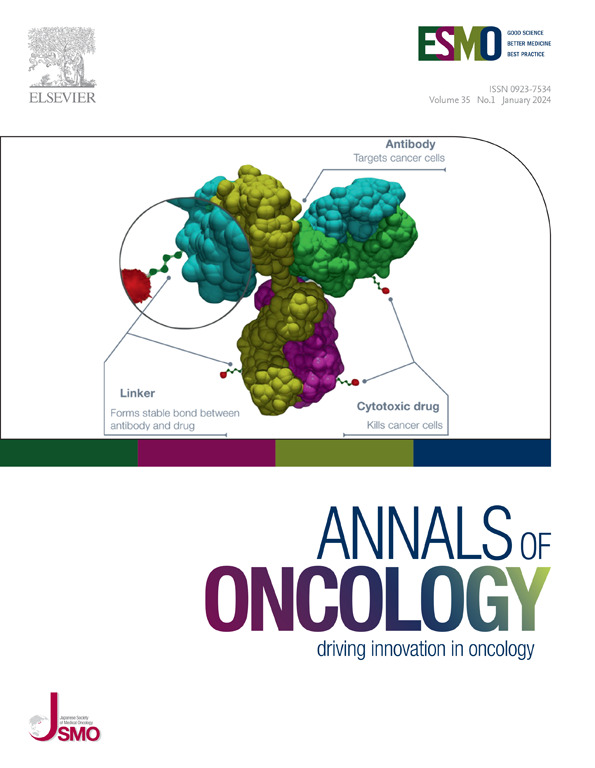Tocilizumab and immune signatures for targeted management of cytokine release syndrome in immune checkpoint therapy
IF 56.7
1区 医学
Q1 ONCOLOGY
引用次数: 0
Abstract
Background
This study aimed to identify specific biomarkers in oncology patients experiencing immune-related cytokine release syndrome (irCRS)-like symptoms during immune checkpoint inhibitor (ICI) therapy, including severe cases like hemophagocytic lymphohistiocytosis (irHLH), and to distinguish these from sepsis. A secondary objective was to retrospectively analyze the efficacy of tocilizumab (TCZ) in treating corticosteroid (CS)-refractory high-grade irCRS.
Patients and methods
A cohort of 35 patients presenting with irCRS-like symptoms was studied, including 9 with irHLH-like manifestations and 8 with sepsis. Immune profiling was carried out using 48 mass cytometry markers, along with an analysis of 45 serum biomarkers, including 27 cytokines and 18 additional markers from the HScore. Twelve patients with high-grade irCRS refractory to CS were treated with TCZ.
Results
Twenty-four biomarkers significantly distinguished between irHLH and grade 3 irCRS (P = 0.0027-0.0455). Hepatocyte growth factor (HGF) and ferritin had superior predictive values compared with the traditional HScore, both with a positive predictive value (PPV) and negative predictive value (NPV) of 100%. CXCL9 differentiated irHLH from grade 3 irCRS and predicted the need for TCZ treatment intensification (PPV = 90%, NPV = 100%). Additional biomarkers, including leukocyte count, neutrophils, ferritin, interleukin (IL)-6, IL-7, epidermal growth factor, fibrinogen, and granulocyte–macrophage colony-stimulating factor (GM-CSF), discriminated sepsis from high-grade irCRS (PPV = 75%-80%, NPV = 100%). Elevated frequencies of CXCR5+ or CCR4+ CD8 memory cells, CD38+ intermediate monocytes, and CD62L+ neutrophils were observed in high-grade irCRS compared with sepsis. All 12 patients with high-grade irCRS refractory to CS treated with TCZ experienced complete resolution.
Conclusions
This study highlights the importance of specific immunologic biomarkers in determining irCRS severity, predicting outcomes, and distinguishing between irHLH, irCRS, and sepsis. It also demonstrates the efficacy of TCZ in managing high-grade irCRS, underscoring the need for personalized therapeutic strategies based on these biomarkers.
Tocilizumab和免疫标记用于免疫检查点治疗中细胞因子释放综合征的靶向管理。
背景:本研究旨在鉴定在免疫检查点抑制剂(ICI)治疗期间出现免疫相关细胞因子释放综合征(irCRS)样症状的肿瘤患者的特异性生物标志物,包括严重的噬血细胞性淋巴组织细胞增生症(irHLH),并将其与败血症区分开来。次要目的是回顾性分析托珠单抗(TCZ)治疗皮质类固醇(CS)难治性高级别irCRS的疗效。患者和方法:研究了35例表现为ircrs样症状的患者,其中9例表现为irhlh样症状,8例表现为败血症。使用48个细胞计数标记进行免疫分析,同时分析45个血清生物标记,包括27个细胞因子和来自HScore的18个额外标记。12例难治性高级别irCRS患者采用TCZ治疗。结果:24项生物标志物在irHLH和3级irCRS之间有显著差异(P=0.0027-0.0455)。与传统的HScore相比,肝细胞生长因子(HGF)和铁蛋白具有更好的预测值,阳性预测值(PPV)和阴性预测值(NPV)均为100%。CXCL9将irHLH与3级irCRS区分,并预测需要加强TCZ治疗(PPV=90%, NPV=100%)。其他生物标志物,包括白细胞计数、中性粒细胞、铁蛋白、IL-6、IL-7、EGF、纤维蛋白原和GM-CSF,可以区分脓毒症和高级别irCRS (PPV=75-80%, NPV=100%)。与败血症相比,在高级别irCRS中观察到CXCR5+或CCR4+ CD8记忆细胞、CD38+中间单核细胞和CD62L+中性粒细胞的频率升高。所有接受TCZ治疗的12例难治性高级别irCRS患者均获得完全缓解。结论:本研究强调了特异性免疫生物标志物在确定irCRS严重程度、预测预后以及区分irHLH、irCRS和败血症方面的重要性。它还证明了TCZ在治疗高级别irCRS中的有效性,强调了基于这些生物标志物的个性化治疗策略的必要性。
本文章由计算机程序翻译,如有差异,请以英文原文为准。
求助全文
约1分钟内获得全文
求助全文
来源期刊

Annals of Oncology
医学-肿瘤学
CiteScore
63.90
自引率
1.00%
发文量
3712
审稿时长
2-3 weeks
期刊介绍:
Annals of Oncology, the official journal of the European Society for Medical Oncology and the Japanese Society of Medical Oncology, offers rapid and efficient peer-reviewed publications on innovative cancer treatments and translational research in oncology and precision medicine.
The journal primarily focuses on areas such as systemic anticancer therapy, with a specific emphasis on molecular targeted agents and new immune therapies. We also welcome randomized trials, including negative results, as well as top-level guidelines. Additionally, we encourage submissions in emerging fields that are crucial to personalized medicine, such as molecular pathology, bioinformatics, modern statistics, and biotechnologies. Manuscripts related to radiotherapy, surgery, and pediatrics will be considered if they demonstrate a clear interaction with any of the aforementioned fields or if they present groundbreaking findings.
Our international editorial board comprises renowned experts who are leaders in their respective fields. Through Annals of Oncology, we strive to provide the most effective communication on the dynamic and ever-evolving global oncology landscape.
 求助内容:
求助内容: 应助结果提醒方式:
应助结果提醒方式:


